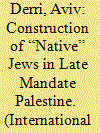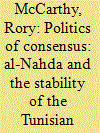| Srl | Item |
| 1 |
ID:
179850


|
|
|
|
|
| Summary/Abstract |
This article concerns the place of late Ottoman Jews in Palestine on the eve of the 1948 War. It focuses on Israel Ben-Zeʾev (Wolfensohn), a Jerusalem-born educator and Nahda intellectual who led a movement of self-identified “native” Jews, including both “Old Yishuv” Ashkenazim and Sephardim, to combat their marginalization by the Zionist institutions. I examine his lifetime struggle to advance the study of Arabic and “Arab Jews” (yahud ʿarab) under early Islam by creating institutions of knowledge production and educational programs modeled on those he knew from his early academic career in Cairo. It was in the context of these struggles that demands for separate political representation for native Jews and for a specialized field of Arab Jewish studies coalesced as part of a broader project of a shared Arab-Jewish cultural modernization. They culminated in 1948, when Ben-Zeʾev finally realized his Arabic library project, ironically using looted Palestinian books, only to see its destruction four years later by Zionist leaders and Hebrew University professors.
|
|
|
|
|
|
|
|
|
|
|
|
|
|
|
|
| 2 |
ID:
163762


|
|
|
|
|
| Summary/Abstract |
Tunisia&s transition away from authoritarianism has been shaped by a politics of consensus, which has brought together representatives of the former regime with their historic adversary, the Islamist movement al-Nahda. This article argues that consensus politics was a legacy of the authoritarian regime that was re-produced during a democratizing transition. The politics of consensus was encouraged and enabled by al-Nahda, which prioritized its inclusion within this elite settlement to provide political security for itself and the broader transition. However, this came at a cost, engineering a conservative transition, which did not pursue significant social or economic reform. The Tunisian case shows that historical legacies, such as consensus politics, can shape a transition as much as contingent, pragmatic decisions by political leaders.
|
|
|
|
|
|
|
|
|
|
|
|
|
|
|
|